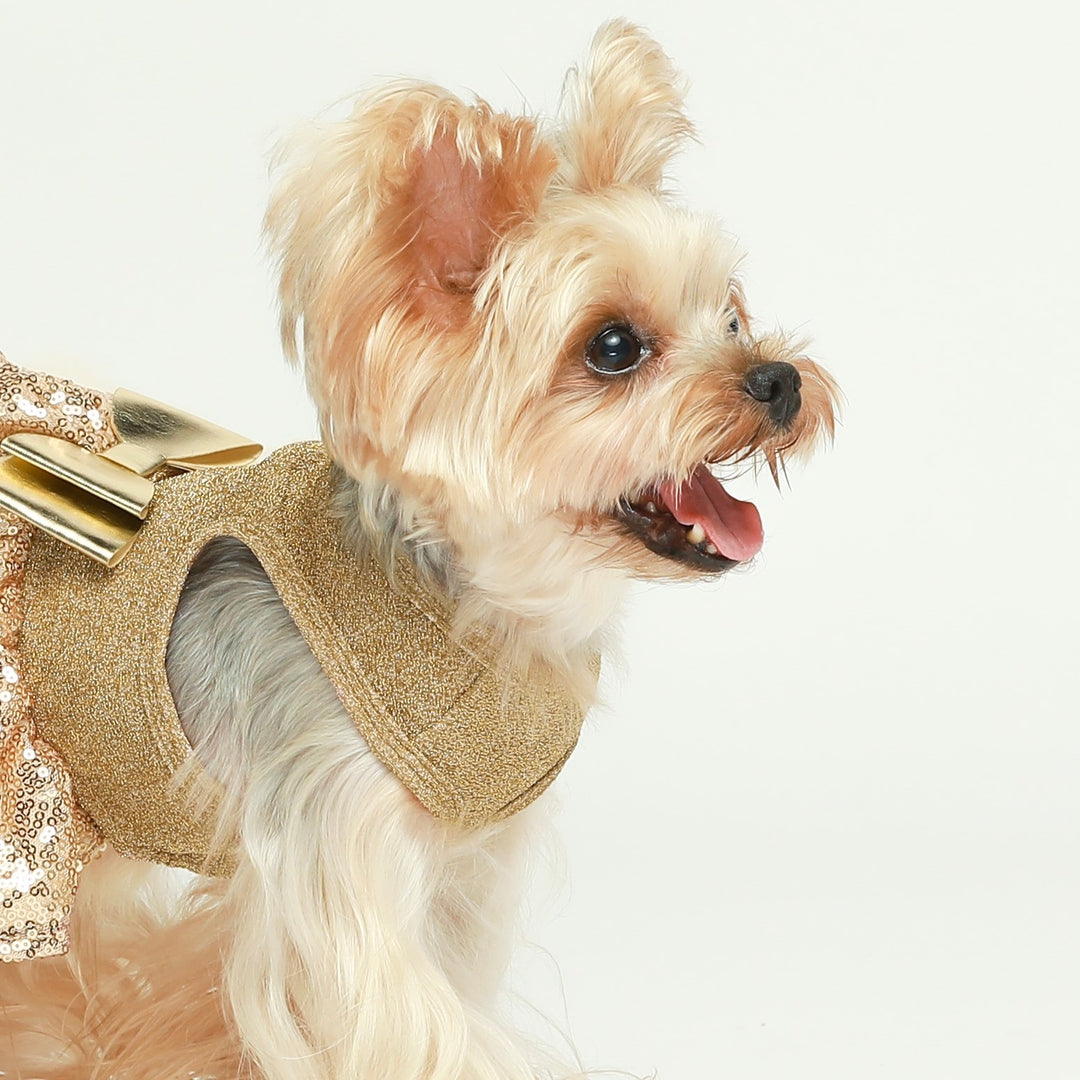How Strong Is the Bite Force of a Shih Tzu?
When you look at a Shih Tzu, with its friendly eyes and long, silky coat, you might find it hard to imagine this small, lap-sized pooch having much bite power at all. But don’t let their diminutive stature and endearing expression fool you; these dogs have jaws and teeth just like any other canine.
 Instagram: izzy_and_layla_
Instagram: izzy_and_layla_
This article delves into the surprisingly complex world of the Shih Tzu’s bite force. As we explore how their bite strength measures up — not just against fellow toy breeds but within the wider dog kingdom — we’ll uncover what factors contribute to their nipping power and how, as Shih Tzu owners or dog enthusiasts, we can understand and manage their behavior for a safer and happier cohabitation.
What Exactly Is Bite Force and How Do We Measure It?
Bite force is the scientific term for the power exerted by your dog’s jaws when they clamp down on something. Think of it as the dog version of a human handshake—some are firm and authoritative, while others are gentle and restrained. In our furry friends, this force is measured in pounds per square inch, or psi for short. This unit of measurement tells us just how much pressure those canine chompers can apply in a single snap.
 Instagram: wakanda_shihtzu
Instagram: wakanda_shihtzu
Picture a scale ranging from the mighty bite of a crocodile at the high end to the delicate nibble of a mouse at the low end. Dogs fall somewhere in between, with breeds varying widely in their natural biting power. A large breed like a Mastiff might register a formidable 500 psi, while a small Yorkshire Terrier barely hits the double digits. Where does the Shih Tzu fit into this range? Well, let’s just say they’re more of a light squeeze than a vice grip.
How Do Little Paws Measure Up?
When we consider the Shih Tzu, known more for their companionship than any fearsome predatory ability, their bite force reflects their non-threatening nature. While exact numbers for Shih Tzus specifically can be elusive, most toy breeds have a bite force that registers on the lower end of the spectrum. For comparison, an average domestic dog’s bite force is about 230-250 psi, whereas smaller dogs, like the Shih Tzu, typically have a much gentler bite estimated at around 150 psi or less.
 Instagram:izzy_and_layla_
Instagram:izzy_and_layla_
The Factors Behind the Fangs
A variety of factors play a role in determining the bite force of a Shih Tzu. Genetics come into play, with jaw size and muscle structure being inherited traits that contribute to how much pressure they can exert. Age is another consideration; puppies will have a softer bite than adults, and senior dogs often have reduced strength due to dental wear and tear. Training and behavior also influence how and when a dog uses its bite. A well-socialized Shih Tzu is less likely to use its full force, while one that feels threatened or hasn’t been taught proper bite inhibition might strike harder.
Understanding these elements helps paint a clearer picture of a Shih Tzu’s bite. Although they’re not setting records with their biting power, knowing what influences it and how strong it can potentially be is valuable information for any owner who wants to keep both their pet and their surroundings safe and happy.
What Is the Average Bite Force of a Shih Tzu?
Diving into the nitty-gritty of a Shih Tzu’s bite, we find ourselves looking at numbers that might seem modest compared to their larger canine cousins. While there isn’t an abundance of specific research on Shih Tzus’ bite force, studies suggest that small dogs typically exhibit a bite force between 100 to 200 psi. Considering the Shih Tzu’s petite size, it’s safe to say their bite force leans towards the lower end of this range.

 Instagram: wakanda_shihtzu
Instagram: wakanda_shihtzu
Size Matters: The Shih Tzu Jaw in Focus
When it comes to bite force, every pound and inch matters. Shih Tzus are compact little pups, and this directly impacts their biting ability. Their small jaws just don’t have the same room for large muscles that you’d find in bigger breeds. But what they lack in muscle mass, they make up for with quick, sharp bites. However, these aren’t meant to do harm; they’re more like a swift way to communicate or play.
Breed Traits: The Gentle Snap of a Shih Tzu
Shih Tzus were bred to be companions, sitting pretty on laps rather than taking down prey. Their temperaments are generally affectionate, and this is reflected in the way they use their mouths. Even when a Shih Tzu gets a bit snappy, it’s usually more noise and surprise than actual force. Plus, their breed characteristics include a less pronounced jaw structure, which doesn’t lend itself to a powerful grip.
 Instagram: 0810.ponpongram
Instagram: 0810.ponpongram
Comparing Canine Chompers: How Does a Shih Tzu Stack Up?
Let’s put the Shih Tzu’s bite into context. If we line them up against other small breeds, we’ll notice that while they might not have the bite force of a Jack Russell Terrier, known for their feisty terrier snap, they do have enough to make their mark (quite literally if they get hold of your favorite slippers). Compared to a Dachshund or a Toy Poodle, the Shih Tzu’s bite force is likely on par, gentle enough to ensure interactive play without too much worry about injury.
While a Shih Tzu could never boast the jaw power of a guard dog, they certainly possess enough to chew through their toys and treats. And really, for a dog whose main job is to be adorable and loving, that’s plenty strong enough.
What Influences the Bite Strength of a Shih Tzu?
Even within the realm of the gentle Shih Tzu, not all bites are created equal. Several factors can affect just how much force a Shih Tzu’s bite may pack. Let’s explore what contributes to the strength behind those tiny teeth.
 Instagram: wakanda_shihtzu
Instagram: wakanda_shihtzu
Is the Bite Mightier by Nature?
Breeding and genetics play fundamental roles in shaping a Shih Tzu’s bite force. These dogs have been bred over generations primarily for companionship, which favored a softer bite compared to breeds developed for hunting or guarding. The genetic blueprint of a Shih Tzu encompasses traits like skull shape and jaw alignment, which naturally limit the potency of their bite.
Growing Pains and Gains: Age and Dental Health
A Shih Tzu puppy’s bite force is nothing to be wary of. Their milk teeth are not only temporary but also not as strong. As they grow into adulthood, their bite force increases with the development of stronger jaws and the emergence of adult teeth. However, this peak doesn’t last forever. As Shih Tzus enter their golden years, they may face dental challenges common in small breeds, like tooth decay and loss, diminishing their bite force.
 Instagram: flora.andjune
Instagram: flora.andjune
Lessons Learned: Training’s Impact on Bite Habits
The way a Shih Tzu is raised can significantly influence its biting behavior. Early training and socialization can teach a Shih Tzu bite inhibition — the ability to regulate the force of a bite. A well-trained Shih Tzu is less likely to use its full potential bite force, reserving its teeth for eating and picking up toys rather than nipping at people or other pets.
Emotions in Motion: Mood and Biting Response
Finally, it’s vital to consider the emotional state of a Shih Tzu. When these dogs feel threatened or stressed, they might react defensively with a stronger bite. It’s a primal response, not unique to Shih Tzus but to animals in general. Understanding and managing the situations that provoke anxiety in your pet will reduce the likelihood of fear-induced biting.
In sum, while you might never need to worry about a Shih Tzu’s bite in terms of sheer force, recognizing what influences their biting can help ensure their nibbles remain friendly and safe. From genetic predispositions to the effects of age, health, and behavior, many variables come together to explain just how strong a Shih Tzu’s bite could be.
How Can You Train Your Shih Tzu to Be Gentle with Their Mouth?
Training a Shih Tzu to be gentle with their mouth is crucial for preventing biting incidents. It’s not just about obedience; it’s about communication and understanding between you and your furry companion. Let’s look at some practical training tips, socialization strategies, and best practices to ensure your Shih Tzu has the manners of a canine gentleman or lady.
 Instagram: wakanda_shihtzu
Instagram: wakanda_shihtzu
Practical Training Tips for Soft Mouths
- Start Early: The training must begin as early as possible when your Shih Tzu is brought home. Especially puppies learn how to inhibit the force of their bites when they engage in play such as tug of war with you. You can condition them to ‘drop’ or ‘leave it’ on command.
- Use Positive Reinforcement: Reward your Shih Tzu when they play gently or lick instead of biting. Treats, praises, and favorite toys work well for positive reinforcement.
 Instagram: kingston_cozmo_bijou
Instagram: kingston_cozmo_bijou
- Teach Bite Inhibition: Allow your Shih Tzu to know when a bite has hurt. Yelp or say “ouch” in a firm tone when they nip during play. Then stop the play for a second. They will learn that gentle play goes on while rough play stops.
- No Bite’ Command: Incorporate a specific command such as “no bite” into your training. You are telling your Shih Tzu precisely what behavior you want by being consistent with the “no bite” command.
Strategies for Early Socialization
- Puppy Classes: Enroll your Shih Tzu in puppy classes so that they interact and socialize with other dogs and people to grow into wonderful, mature adults.
- Expose to New Experiences: Introduce your Shih Tzu to various situations — different people, sights, sounds, and animals — to reduce fearfulness that can lead to defensive biting.
- Play Dates: Let your Shih Tzu go out regularly for playdates with other friendly dogs. This will teach him good social behavior and how to interact appropriately.
Best Practices for Handling Nips and Bites
- Stay Calm: If your Shih Tzu is nipping, then be nonchalant about it. Yelling or spanking does one of two things: to increase the aggression or to put your pet in a state of fear.
 Instagram: wakanda_shihtzu
Instagram: wakanda_shihtzu
- Redirect the Behavior: If you see your Shih Tzu getting a bit nibbly, then give him a chew toy or a bone. The redirection helps to shift their mind onto something else.
- Professional Help: If the dog continues to bite or if the level of biting increases, then it is time to seek professional help. The dog trainer or behaviorist can now provide you with specific advice and intervention strategies based on the needs of your Shih Tzu.
Keep Your Shih Tzu Friendly
Your cute Shih Tzu comes with responsibilities. They are not big bitters, but they do have teeth! A little training goes a long way to ensure that those teeth are only used for chomping on toys, not fingers or furniture. It is all about being proactive: teach them young and keep things positive, and you will both have time without stress. If an oops bite happens, know how and when to call the doctor. Now, go ahead and shower your Shih Tzu with a little love, and get practicing those gentle play tricks. You are well on the way to creating a safe, bite-free zone that everyone can enjoy.














